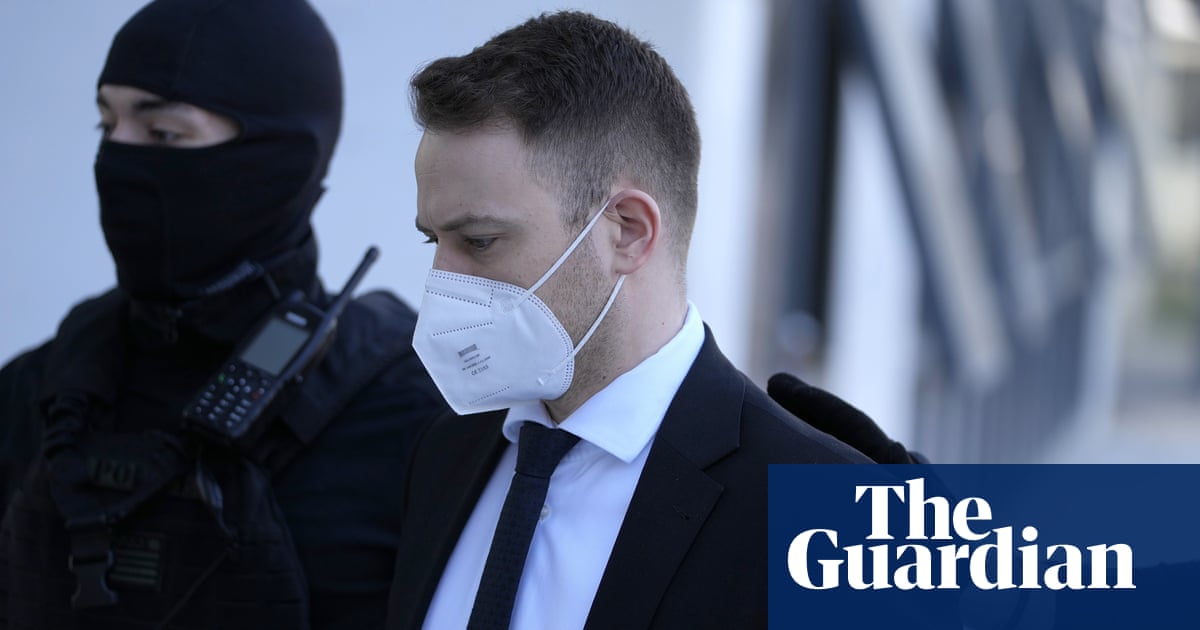
Last week, Greek helicopter pilot Babis Anagnostopoulos stood in the dock of an Athens court and related the circumstances that led him to suffocate his British wife. Over the course of 10 hours he barely paused. Coolly and calmly, from 10am to 8pm, he addressed the tribunal.
He recalled the dream life he had shared with the woman whom he would go on to asphyxiate; his decision to choke her beloved puppy, Roxy, hanging the pet dog from the banister of the couple’s maisonette; his love for his baby daughter, whom he would place next to her dead mother’s body; and his determination in a moment “of chaos” to cover up the killing as a robbery gone terribly wrong.
Exactly a year to the day after Caroline Crouch’s death, her husband, who has confessed to killing her, was having his day in court.
For observers, it was an extraordinary performance by a man bent on proving that, far from being pre-meditated, the murder of the 20-year-old was a crime of passion attributable solely to his “blurred state of mind”.
Yet the pilot’s perseverance also hinted at something else: he seemed to be enjoying the courtroom drama, delivering lines that were both studied and well-rehearsed.
“It was testimony you rarely see and you rarely hear,” said Giota Tessi, a court reporter who, seated within view of the bench, watched the proceedings throughout. “Yes, it was well prepared and yes, he is clever, but beyond that there was something else. His grasp of legal terminology, for example, was exceptional. If you had not seen him uttering the words you’d have thought it was a lawyer speaking.”
From the outset, the 34-year-old was a different kind of defendant, she said. “He seems always to be looking out for the cameras, and then straight into them. He’s a narcissist, he likes the attention.”
On Monday, almost six weeks after it began, the trial will draw to an end with the seven-member court expected to announce a verdict. It will be no ordinary denouement.
Few crimes have transfixed Greeks as has the murder of Crouch, the daughter of a retired oil executive and Filipina mother whose body was found in the maisonette on the outskirts of Athens on 11 May last year.
In a coroner’s report, the student’s death was described as “agonising”. The Briton, it said, had been asleep when her killer struck. Evidently startled, her pulse rose sharply during an attack that lasted at least five minutes.
Outrage over the crime prompted the government to announce a €300,000 reward for information that might lead to the arrest of the culprits.
For nearly six weeks, the UK-trained aviator claimed that his wife’s murder had been the result of a bungled burglary – a fiction whose every twist and turn then hogged media headlines as police tried to track down the ruthless gang of foreigners who had allegedly tied up the pilot and killed the young mother.
It was only when analysis of the smartwatch that Crouch had been wearing, and data on his mobile phone, revealed inconsistencies in his version of events that investigators got the breakthrough they were looking for – and detained the pilot as he attended a graveside memorial on the island of Alonissos, where his wife had been brought up.
His confession, elicited after eight hours of police interrogation, would leave Greeks and Crouch’s distraught parents stunned.
Testifying before the mixed jury court only hours before the defendant’s testimony, the psychiatrist Alchestis Igoumenakis argued that all the evidence pointed to the murder having been premeditated.
“The accused has shown a lack of emotion, and conceit,” she said, adding that she had been left in no doubt that Anagnostopoulos was suffering from severe antisocial personality disorder: “In narcissistic disorder, we have feelings of superiority and lack of empathy. He murders his wife, the mother of his child, and doesn’t understand that the child will hurt … the fact that he placed the baby next to her [dead] mother is especially barbaric.”
The pilot also stands accused of the unprovoked death of an animal and of perverting the course of justice – charges that, if proven, will increase the life sentence he almost certainly faces. But in the wake of his marathon testimony, his lawyer insisted that while the pilot expected to be punished, the killing had occurred in the heat of the moment and, like all crimes of passion in Greece, should be treated more leniently.
“No one will accept that argument because it is so old-century,” retorted Maria Gavouneli, president of the Greek national commission for human rights and professor of international law at Athens University.
“We are talking about a young woman, who had a baby at a very young age, being dead at the age of 20 … once you have a defendant [in the dock] you have to let them speak, you don’t stop them. All my instincts tell me this was testimony that was rehearsed by a showman who was milking it for all it takes, and enjoying it.”
The murder has not only laid bare the ability of an individual to fool authorities but also exposed fault lines in a society that has been grappling with a wave of femicides whose ferocity has stunned the nation. Crouch was one of 17 women whose lives were cut short at the hands of their partners in Greece in 2021.
Almost every one of the victims – including a 43-year-old pharmacist who was strangled by her husband in a village outside Kavala last week – had, before her death, tried to end an abusive relationship.
Crouch was no different. Four years after she met Anagnostopoulos – whose courtship included flying a helicopter over her school – the teenager described, in a handwritten diary that chronicled her fears, how her marriage had collapsed amid recriminations and rows with her highly controlling partner.












